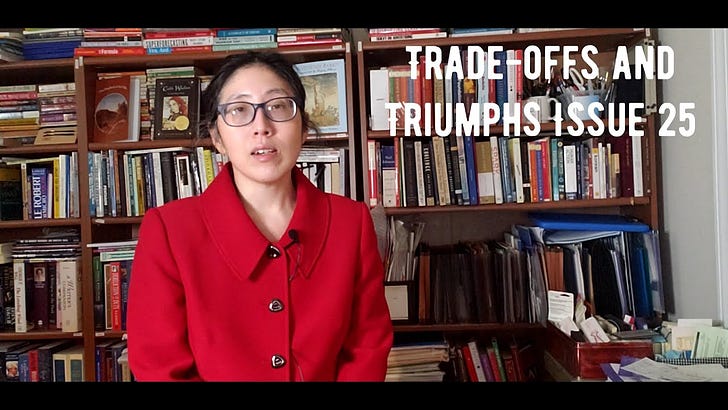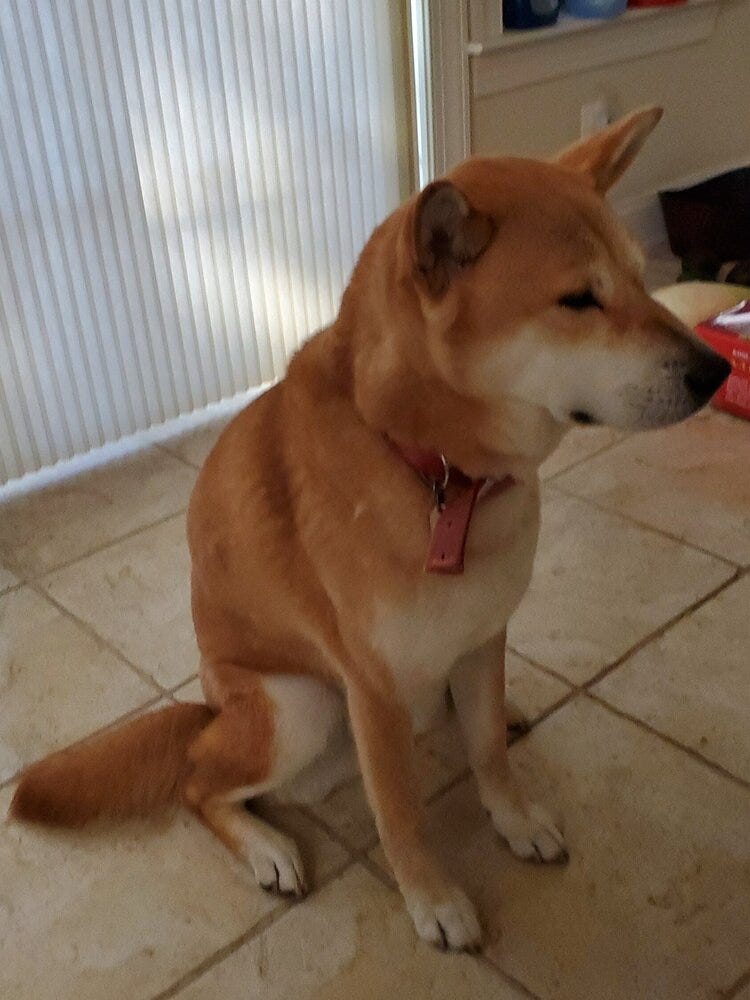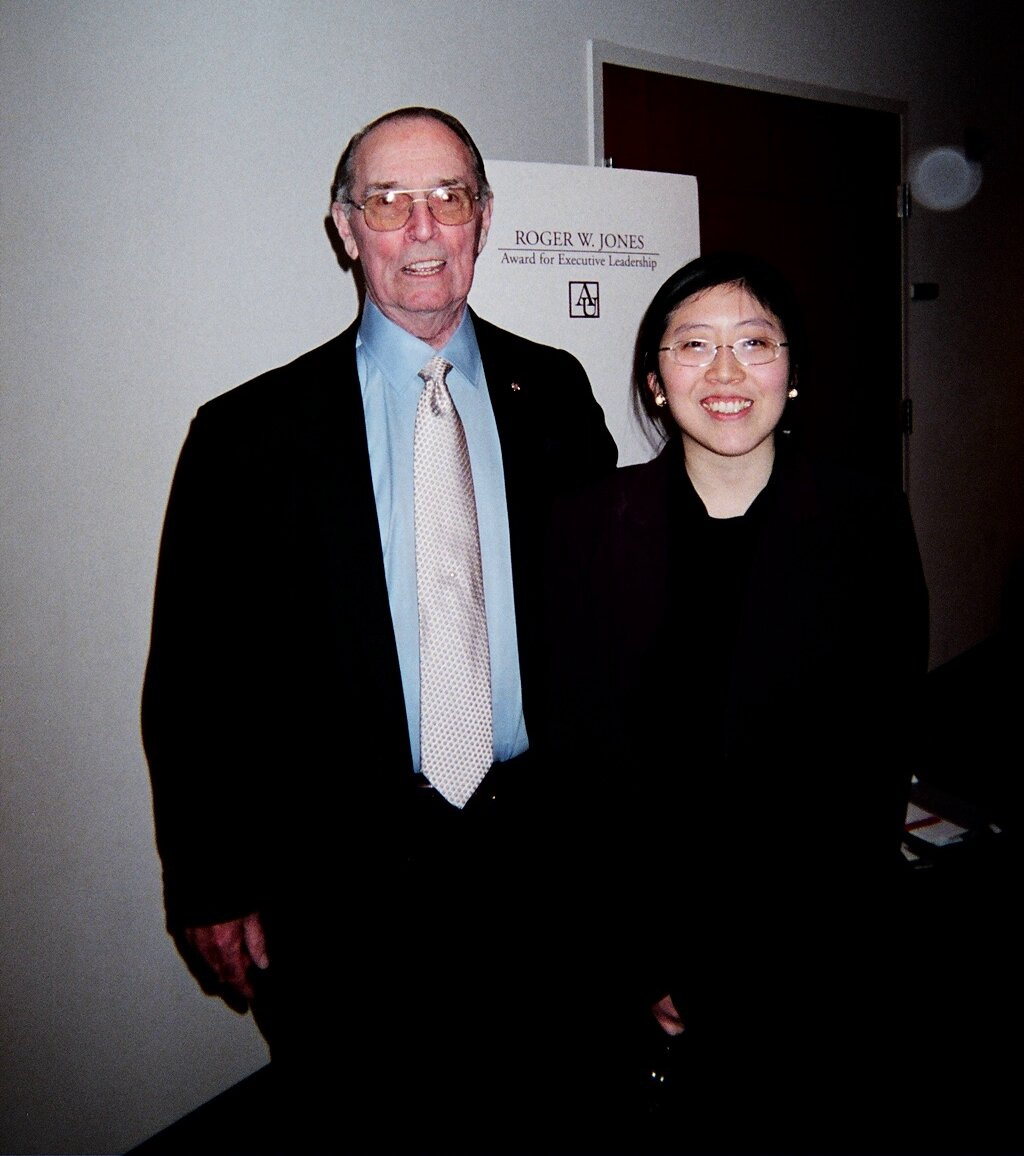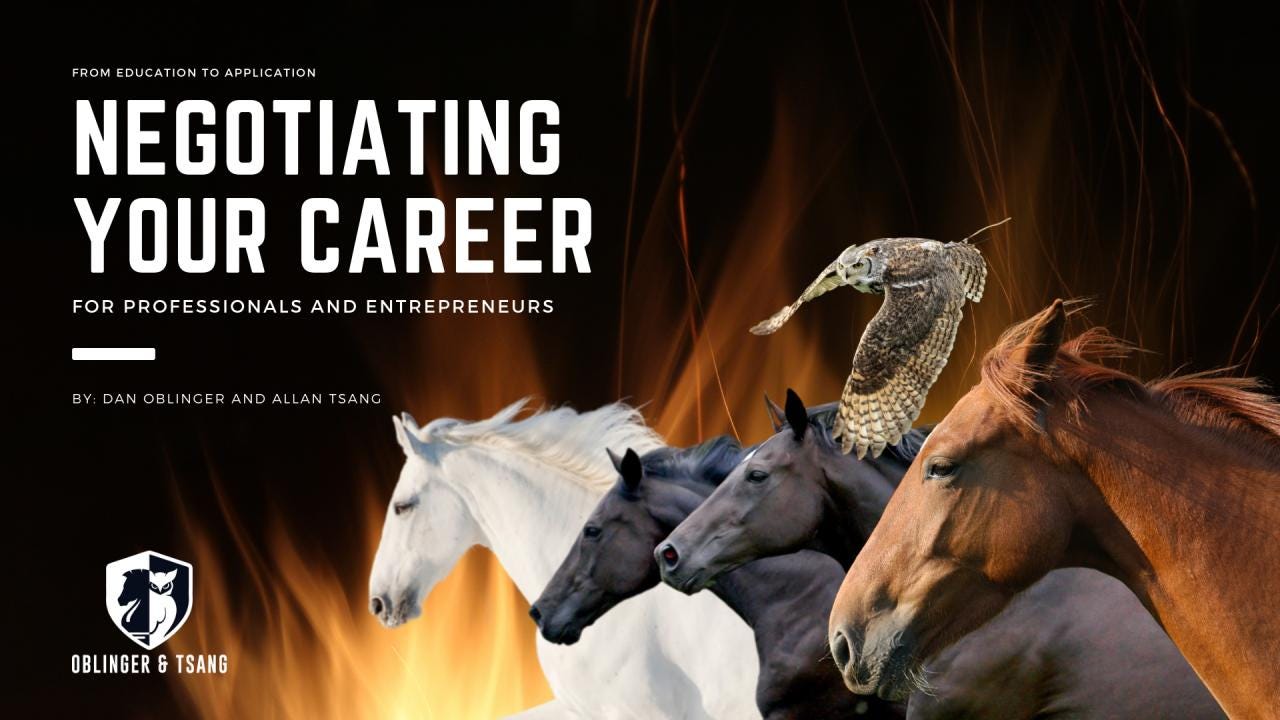Trade-offs and Triumphs 25 by @jennykim
Issue 25: Mentors of All Shapes and Sizes, Negotiating Your Career, Resources for the Week, Closing Thoughts: Don't Let Your Identity Restrict You
👋 Hello, friends! Thank you to my 133 subscribers.
Welcome to issue 25 of Trade-offs and Triumphs - a newsletter of resources and thoughts about how to balance trade-offs in life to find and celebrate the small triumph; every decision point requires thinking through trade-offs and not just immediately aiming for the “solution.”
How was your week? What were your trade-offs and triumphs?
This week we will hit on:
Mentors of All Shapes and Sizes
Negotiating Your Career
Resources for the Week
Closing Thought: Don’t Let Your Identity Restrict You
For a quick oral summary of Issue 25, hit ▶️ below:
🐕🧑🏫 Mentors of All Shapes and Sizes
Do Dogs Really Make Us Happier? Learn how to communicate effectively without words from your dog the mentor
Wise and faithful counselors are out there for everyone - but you have to do the work to sift through and to find them.
And sometimes, they are right in front of you - even as a furry creature.
Enter Athena the Korean Jindo, mentor to Jenny Kim.
Over twelve years ago, when I visited the farm to pick up my dog Athena, I did not know what to expect. I had read all the books about how to train and to raise dogs, but I also knew that reality differed from the lessons offered in books. All I knew was that Athena was adorable, and at four weeks, what puppy is not cute?
What I had not realized - when your counterparty cannot communicate orally, you have to acquire a new vocabulary on building a relationship, good habits, and understanding incentives. Yelling “don’t do that” or “why did you do that” did not help Athena to understand why certain behaviors were problematic and should not be repeated.
All I received from Athena when I yelled after wires had been chewed or she had had a bathroom accident was a head tilt and sad puppy eyes - not behavior change.
How do I communicate with a creature who does not communicate orally?
I paid more attention to how Athena responded when I or any of our other family members instructed her to do something or expressed displeasure.
What did Athena pay attention to when she decided to listen to our instructions? What signals did she seek to affirm her hunches about her strange hoo-man family?
Over 90 days, I experimented and noted what worked to “train” Athena:
Calm, steady body language that affirmed my oral instructions
Consistently calm and steady body language
Consistent and immediate enforcement of punishment at the time that she committed a bad act (e.g., urinating indoors, chewing wires and shoes, clawing through the drywall)
Consistent and calm affection for orders that she followed and of course, providing a treat (e.g., Pup-Peroni, Milkbone)
Lots of side-by-side time spent together doing nothing
I noted what had not worked with Athena as well:
Yelling and using agitated body language
Punishing her after I found out about a bad act
Inconsistency about enforcing the rules
Expecting her to control her emotional impulses after a couple of instructions
Asking her why she did something when she cannot respond orally anyway
As someone who relied almost exclusively on relaying advice and instructions through written and oral means, I had forgotten about observing my counterparty’s nonverbal cues. Athena reminded me strongly that I had to strengthen this muscle.
Watch and listen for unarticulated thoughts and emotions - they provide us keys to true understanding and communication.
Leadership in practice: Mentor Spotlight - David M. Altwegg
“Leadership” is simple yet complex — it is about putting others before yourself, establishing and promoting trust and loyalty, and being a lifelong learner, because no one does it alone. It is a 24–7 type of dedication — it does not mean that you cannot enjoy life outside the office but life is better when you work at something that you are passionate about.
And, it is easier to put down words on paper about “leadership” than to actually practice and improve every day. But you have to — it’s like brushing and flossing your teeth.
You need to do it everyday.
When I first joined the Missile Defense Agency as a Presidential Management Fellow, my first rotation did not go so well. Within three months of arriving there, I raised my hand and asked HR for a new rotation assignment.
HR re-assigned me to the department of the late retired Rear Admiral David M. Altwegg.
I had heard quite a bit about Mr. Altwegg, that as a retired 2-star admiral, he was demanding, direct, and forceful. When I entered his office for our first meeting/interview, I maintained a pleasant, noncommittal expression. I did not know what to expect.
Our relationship began with a short conversation like this:
Mr. Altwegg: So I have not read your resume.
Me: That’s ok. There is not much to read on there. You’re not missing anything.
Mr. Altwegg (arched an eyebrow): Oh? And you’re a lawyer?
Me: I just passed the bar. That does not mean anything. I am still learning.
Mr. Altwegg (with his hands and arms raised and clasped above his head as he leaned back in his chair) Well, you’re a PMI (presidential management intern — which was what the program had originally been called), so you need to learn and to follow me around. I will take you to every meeting. And I will be your mentor.
Me: (very politely but not believing him) That would be great. Thank you. I will stop wasting your time and I will work with your assistant to figure out your schedule. Thank you for the opportunity.
And just like that, our first conversation ended.
I think about that conversation to this day, especially during troubled moments.
Mr. Altwegg opened every door for me. As he promised, he took me to every meeting, including ones with all the senior officials, and made sure that I sat at the main conference table rather than on the sidelines. He treated me like a colleague rather than an “intern” or “fellow,” and asked for my perspective. He also ensured that I had the opportunity to serve at The White House Office of Counsel to the President.
Before I even believed in myself, Mr. Altwegg believed in me, and encouraged me to explore every avenue possible. He opened his contact list and made introductions. Those introductions led to my later positions at various law firms and my current position at a large corporation. And he did not do this just for me, but for anyone he believed in.
Mr. Altwegg demonstrated leadership by acting and not just with fluffy words.
I strive to honor Mr. Altwegg by doing this for my team and others around me who seek opportunities and counsel. True leadership is recognizing the talent around you and doing everything to help that talent grow, even if that means that they leave you.
I cannot ever repay the late Mr. Altwegg, but I can pass on his boundless generosity to others.
✨Who have been your most unusual mentor(s)?
✨How have you passed on and down the generosity of others?
I would love to hear from you - please leave a comment.
👨🎓📈👨💼📈👨⚖️ Negotiating Your Career and Trade-offs
✨What is your mission and purpose?
Last Friday, Allan Tsang and Dan Oblinger launched the first workshop of 2021 - “Negotiating Your Career.” The agenda focused on practical takeaways for:
Job interviews or client meetings
Addressing difficult questions
Using discovery to make go/stay decisions
Strategies for creating new value in an old job
3 step process to help your supervisor listen and value your requests (Situation-Assessment-Recommendation - SAR)
And then, we all immediately jumped into role play via the various breakout rooms with Allan and Dan floating from room to room. We all struggled through our role plays as we tried to tackle difficult questions and engage in more effective discovery. I have a tendency to immediately go into problem solving without conducting adequate discovery, a habit I am consciously trying to break.
But no matter what the role play, a few key things stood out:
You need to know your mission and purpose. That is your foundation.
Focus on discovery and be patient. Go slowly to move quickly.
Use curiosity when you face difficult questions.
Don’t “solve the problem” too quickly - qualify and quantify.
In addition to asking and answering questions, don’t forget about making observations.
Like diet and exercise, everything is about consistency and repetition. Becoming more self-aware leads to being more intentional about discovery and the choices that we make. We fall back on our training - we usually don’t rise up to the challenge with newly learned habits.
Role plays are a key part of building better habits around negotiation and discovery.
Because everything in life is a negotiation, especially when you are constantly deciding about trade-offs. You can decide on trade-offs only if you are clear about your mission and purpose.
✨What is your mission and purpose?
Don’t forget to check out the #NegotiationTribe the first Friday of every month at 2pm Eastern Time, US. For details, click the blue box:
✊⚒️️🧰 Resources for the Week
✅Patricia Mou’s Checklist To Get Through Anything


✅ Ramses Oudt How to Become a Better Learner (Metacognitive Loop)


✅
Closing Thought: Don’t Let Your Identity Restrict You
Outcomes are about what you get. Processes are about what you do. Identity is about what you believe. - James Clear


Please leave me your questions or thoughts in the Comments section below 👇👇👇
You can also:
Follow me on Twitter or DM me there, or
Email me at jennykimwop@gmail.com.
If you are enjoying Trade-offs and Triumphs, I would love it if you shared it with a friend or two by forwarding it or sharing it with the button below!
Be conscious of your trade-offs. Before settling on any one “solution,” run your fingers through all the trade-offs and decide intentionally and specifically.
And then celebrate your triumphs, no matter how small.
See you next week!






The advice of thinking of your dog as a mentor is exactly my kind of creative. Such an interesting idea. Thanks for sharing Jenny